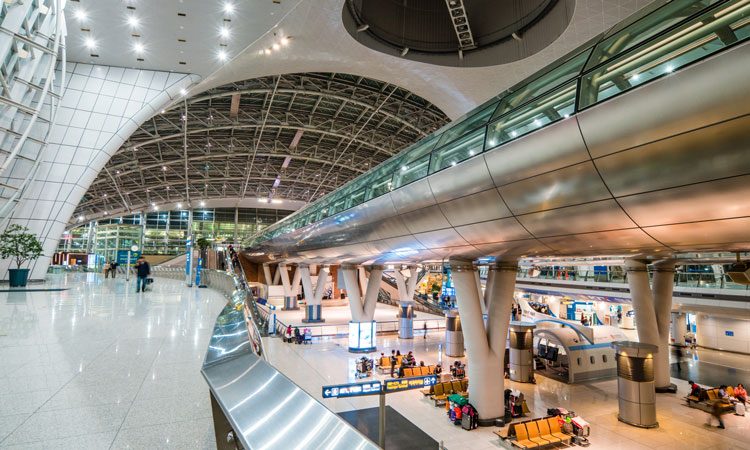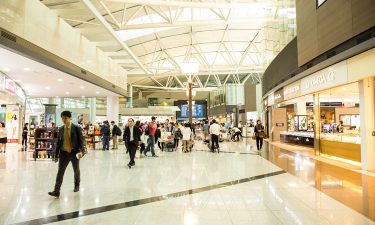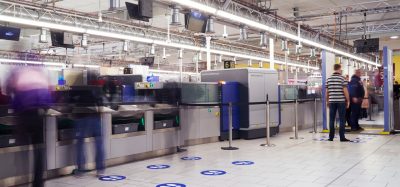Smart Airport Plan: Making the future of the airport a reality
- Like
- Digg
- Del
- Tumblr
- VKontakte
- Buffer
- Love This
- Odnoklassniki
- Meneame
- Blogger
- Amazon
- Yahoo Mail
- Gmail
- AOL
- Newsvine
- HackerNews
- Evernote
- MySpace
- Mail.ru
- Viadeo
- Line
- Comments
- Yummly
- SMS
- Viber
- Telegram
- Subscribe
- Skype
- Facebook Messenger
- Kakao
- LiveJournal
- Yammer
- Edgar
- Fintel
- Mix
- Instapaper
- Copy Link
Posted: 31 October 2019 | International Airport Review | 21 comments
We spoke to Myojung (MJ) Koh, Smart Airport Team Manager at Incheon International Airport, about how the airport’s Smart Airport Plan is revolutionising the passenger experience.


Passenger experience at Incheon International Airport has long been an important aspect for the airport, with it receiving numerous awards for customer service. Now, with modern passengers’ expectations getting ever higher, the airport is taking its passenger experience initiatives a step further, implementing its Smart Airport Plan.
This includes a mixture of initiatives including a walkthrough self-service security screening system, facial recognition technology-enabled SmartPass check-in and boarding, home baggage drop-off courier service and the deployment of artificial intelligence robots at passenger terminals.
To find out just how integral new technologies are to the future of airports we spoke to Myojung (MJ) Koh, Smart Airport Team Manager from Incheon International Airport at International Airport Review’s flagship conference – Airport IT & Security – where Koh presented the Smart Airport Plan.
Can you give us an overview of Incheon’s Smart Airport Plan?
The Smart Airport Plan at Incheon International Airport is a feature of our future airport model. Passenger expectations have changed, and so the role of the airport has also changed, and we wanted to make the airport a more intuitive and personalised place that connects the passenger and the future.
We wanted to eliminate inconvenience caused by the physical limitations of the airport such as long waiting times and complicated procedures. We also wanted to make being at the airport more enjoyable.


Incheon Airport has long been at the forefront of implementing new technologies, introducing South Korea’s first self bag drop service back in 2015
Incheon Airport has therefore created a Smart Airport Plan consisting of 100 tasks which apply the latest technologies to maximise the passenger experience in three aspects: Process, service and operation. In our Smart Airport Plan, passengers don’t have to leave their homes with heavy baggage or waste their time looking for a parking space as a personalised mobile app and robot will help them.
Also, passport and boarding pass inspection procedures will disappear during all departure processes. It is the latest technologies that make the Smart Airport Plan a reality.
Airport IT & Security, International Airport Review’s annual conference, gathers industry leaders from across the globe to discuss future technologies with airport IT, including AI, robotics, self service and blockchain. Register your interest for Airport IT & Security 2020 now!
Why are new technologies so important for airport operations?
New technology is a key factor to make our Smart Airport Plan a reality. Until now, it has been common for passengers to wait a long time for each departure procedure to be checked for their passport and boarding pass. However, this inconvenience can be eliminated if biometrics, blockchain, big data and AI technologies are used.
It is the latest technologies that make the Smart Airport Plan a reality
With the latest technology, passengers can complete all the identification processes simply by passing through each point. New technologies help the airport of the future, which we have thought of before, to become a reality rather than a dream.
The latest technology is at the core of our Smart Airport Plan, as the element that makes dreams come true.
To what extent will automation play a part in the airport’s future?
Many of Incheon International Airport’s 100 tasks are related to automation. Although automation itself does not mean smart, we are very interested in it because it allows us to operate the airport efficiently. For example, using an AI-based guidance system at the helpdesk would provide more information quickly in comparison to being provided by a person.
Automation allows us to operate the airport efficiently
Self check in and self bag drop are already widely used and help increase the passenger handling capacity of the terminal. In addition, autonomous driving cart robots and PM (Personal Mobility) make it easier for passengers to use the airport. As automation has been a great help to both passengers and airports, I think future airports are very closely related to automation.
What passenger feedback did you receive on the AI robots?


Incheon International Airport takes passenger experience seriously
Incheon Airport’s AI robots provide passengers with a pleasant experience as well as information. In addition to answering passengers’ questions and guiding where they want to go, they also take photos and hand out photo cards to make the passenger experience at the airport a happier one. As a result, many children can be seen staying near robots at Incheon Airport. At Christmas, the AI robots even wore Santa Claus hats.
According to a recent survey, 92 per cent of the passengers were satisfied with the robot service and gave very positive feedback, saying they hoped that more robots would enter the airport. Based on that, we continue to think about the use of robots to entertain and assist passengers.
In your opinion, what is the most important technology within an airport’s approach to seamless travel?
I personally think that the One ID (single token) concept, which is gaining a lot of attention in recent years, will be a major aspect in the future of seamless travel. Each step in the departure process interferes with seamless travel. At each step, passengers must hold their passports and boarding pass and wait for their turn. However, these waiting times can be greatly reduced if identification is made using only biometric information such as face recognition.
One ID will be a major aspect in the future of seamless travel
This is the concept of One ID and the technology I consider important. Sharing this information in different countries will enable seamless travel throughout the journey from departure to arrival. It is also very important in that it makes it impossible to manipulate documents, such as passport forgery and therefore enhances aviation security.
Related topics
Airport development, Autonomous Technology, Baggage handling, Biometrics, Blockchain, ePassports, Information technology (IT), Passenger experience and seamless travel



















This seems to be a Great initiative by “Incheon International Airport”. Hope this smart airport plan will be a precedent for other international airports to implement blockchain, AI and other technologies for the betterment of passenger experience at Airports. Great News, thanks for the update @ International Airport Review
Hey! First of all thanks for the update @ Internation Airport Review Team. It looks to be a good start by “Incheon International Airport”. This would be a great example for other international airports to launch blockchain technology. We can see it as a real-time example who has a graze towards this technology. Thanks for sharing this with us. Good Job.
Hi, thanks for the update. Implementing Blockchain technology in International Airports will be good to begin with. Good work, thanks for sharing.
This will be a great initiative by “Incheon International Airport”. All international airports have to take Incheon International Airport as a role model to enhance the security by implementing Blockchain technology.
Implementing blockchain technology in airport shows the best signs of blockchain advancement and importance.
Hi!
The concept of “One ID will be a major aspect in the future of seamless travel”, is very significant in the case of passport forgery and it helps in enhancing aviation security. The adoption of Blockchain technology with Artificial intelligence is a great innovative idea for an enhanced International Airports. This may be a great initiative for other international airports. Keep sharing us your Smart moves.
Incheon International Airport is making a good utilization of blockchain to build smart airtport. Thanks for sharing this Blockchain news !
Sounds interesting! It’s very nice that the airport is taking its passenger experience initiatives a step further, implementing its Smart Airport Plan. Thanks for sharing such an interesting news.
nice article
Thanks for sharing
Thanks for sharing!
I admire your technology. Unfortunately, our airports are still far from this (I live in Ukraine). Well done, the future is yours.
Thank you very much for sharing the great news regarding the new technology admire the international airport, I hope very much it will reflect i another airport also
I appreciate you exploring Smart Airport. As in the present era, everything is advancing and this is the age of science. So it’s very important to convert things to smart. This will help a lot. Thank you.
That’s great that technologies do not stop their development and now the future airport is closer to us! I like the Smart Airport Plan.
That’s really amazing. The things and technologies we’ve just dreamt of to happen are now taking place in reality.
Congratulations to Incheon International Airport for implementing such great initiatives. Hope other airports of the world also look forward to implementing these type of upgradations.
Really good post. Thank you for giving such good news. Technology gives different directions to our life.
Hi Ankit, many thanks for your message. Thank you for appreciating the technology aspect of this news.
Thank you for the information
Smart airport plans are shaping the future of air travel by integrating advanced technologies to enhance efficiency, security, and passenger experience. These plans focus on automation, data-driven operations, and seamless connectivity, allowing for smoother processes like automated check-ins, facial recognition for security, and personalized services through apps. Additionally, smart airports aim to reduce environmental impact through energy-efficient designs and sustainable practices. With the integration of AI, IoT, and big data, airports are becoming more adaptive and responsive to real-time challenges, making air travel more convenient and futuristic for passengers.
Incheon International Airport’s Smart Airport Plan integrates advanced technologies like AI, biometrics, and automation to enhance passenger experience and streamline operations. Key innovations include self-service security, facial recognition, and AI robots, aiming for a seamless and efficient travel experience.